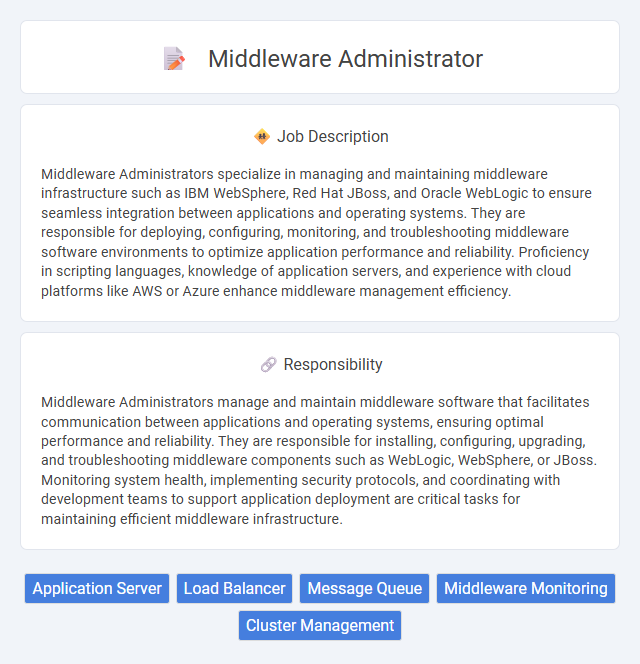
Middleware Administrators specialize in managing and maintaining middleware infrastructure such as IBM WebSphere, Red Hat JBoss, and Oracle WebLogic to ensure seamless integration between applications and operating systems. They are responsible for deploying, configuring, monitoring, and troubleshooting middleware software environments to optimize application performance and reliability. Proficiency in scripting languages, knowledge of application servers, and experience with cloud platforms like AWS or Azure enhance middleware management efficiency.
Individuals with strong analytical skills and a detail-oriented mindset are likely to thrive as Middleware Administrators due to the complex nature of managing middleware systems. Those who excel in problem-solving and can work well under pressure may find this role suitable, as it often involves troubleshooting and maintaining system stability. People who prefer structured environments and enjoy continuous learning about evolving technologies may have a higher probability of success in this position.
Qualification
Middleware Administrators require in-depth knowledge of application server environments such as IBM WebSphere, Oracle WebLogic, or Red Hat JBoss. Proficiency in scripting languages like Shell, Perl, or Python and experience with automation tools such as Jenkins or Ansible enhance middleware deployment and management. Strong understanding of network protocols, security practices, and performance tuning is essential to ensure system stability and scalability.
Responsibility
Middleware Administrators manage and maintain middleware software that facilitates communication between applications and operating systems, ensuring optimal performance and reliability. They are responsible for installing, configuring, upgrading, and troubleshooting middleware components such as WebLogic, WebSphere, or JBoss. Monitoring system health, implementing security protocols, and coordinating with development teams to support application deployment are critical tasks for maintaining efficient middleware infrastructure.
Benefit
Middleware Administrator roles likely offer significant benefits including high demand in IT sectors, providing job security and competitive salaries. Candidates may gain exposure to diverse technologies, enhancing skill sets and career growth opportunities. Organizations probably value these professionals for streamlining application integration, which can lead to performance improvements and operational efficiency.
Challenge
Middleware Administrator roles likely involve the challenge of ensuring seamless integration between diverse software applications and systems, maintaining optimal performance and high availability of middleware platforms. The complexity of troubleshooting middleware issues and coordinating across multiple teams may frequently test problem-solving skills and technical expertise. Continuous learning to adapt to evolving middleware technologies could be a probable ongoing challenge in this position.
Career Advancement
Middleware Administrators manage and optimize middleware platforms such as IBM WebSphere, Oracle Fusion Middleware, and Red Hat JBoss to ensure seamless application integration and performance. Expertise in automation, cloud migration, and security protocols can significantly enhance career growth opportunities within IT infrastructure and DevOps teams. Advancing to senior roles involves mastering container orchestration tools like Kubernetes, gaining proficiency in hybrid cloud environments, and obtaining certifications such as TOGAF or AWS Certified Solutions Architect.
Key Terms
Application Server
Middleware Administrators specializing in Application Server management ensure optimal performance, security, and scalability of middleware infrastructure such as IBM WebSphere, Oracle WebLogic, and JBoss. They handle deployment, configuration, monitoring, and troubleshooting of application servers to support enterprise applications and streamline business processes. Expertise in load balancing, clustering, patching, and automation tools is essential for maintaining high availability and minimizing downtime.
Load Balancer
Middleware Administrators specializing in load balancers ensure optimal distribution of network traffic across multiple servers to enhance application availability and performance. They configure, monitor, and troubleshoot load balancer hardware and software such as F5 BIG-IP, Citrix ADC, or NGINX to prevent server overload and reduce downtime. Expertise in SSL offloading, health checks, and session persistence is critical for maintaining seamless user experiences and robust security.
Message Queue
Middleware Administrators specializing in Message Queue systems manage and optimize robust messaging infrastructures like IBM MQ, RabbitMQ, and Apache Kafka to ensure reliable data transmission across distributed applications. They configure queue managers, monitor message flows, troubleshoot latency or delivery failures, and implement scalability solutions for high-throughput environments. Expertise in scripting automation, performance tuning, secure communication protocols, and disaster recovery planning is essential for maintaining seamless middleware operations supporting enterprise applications.
Middleware Monitoring
Middleware Administrators specialize in Middleware Monitoring by overseeing the performance and availability of middleware platforms such as IBM WebSphere, Oracle Fusion Middleware, and Red Hat JBoss. They use monitoring tools like AppDynamics, Dynatrace, and Splunk to detect and resolve bottlenecks, server failures, and security issues in real time. Proficient in automation scripts and incident management, Middleware Administrators ensure seamless integration and optimal functionality across distributed applications and enterprise systems.
Cluster Management
Middleware Administrators specializing in Cluster Management oversee the deployment, configuration, and maintenance of clustered middleware environments to ensure high availability and load balancing. They monitor cluster performance, manage node failover processes, and implement patching strategies to maintain system stability and security. Expertise in tools like WebLogic, JBoss, or IBM WebSphere, combined with scripting skills, enables efficient automation of routine cluster administration tasks.
 kuljobs.com
kuljobs.com